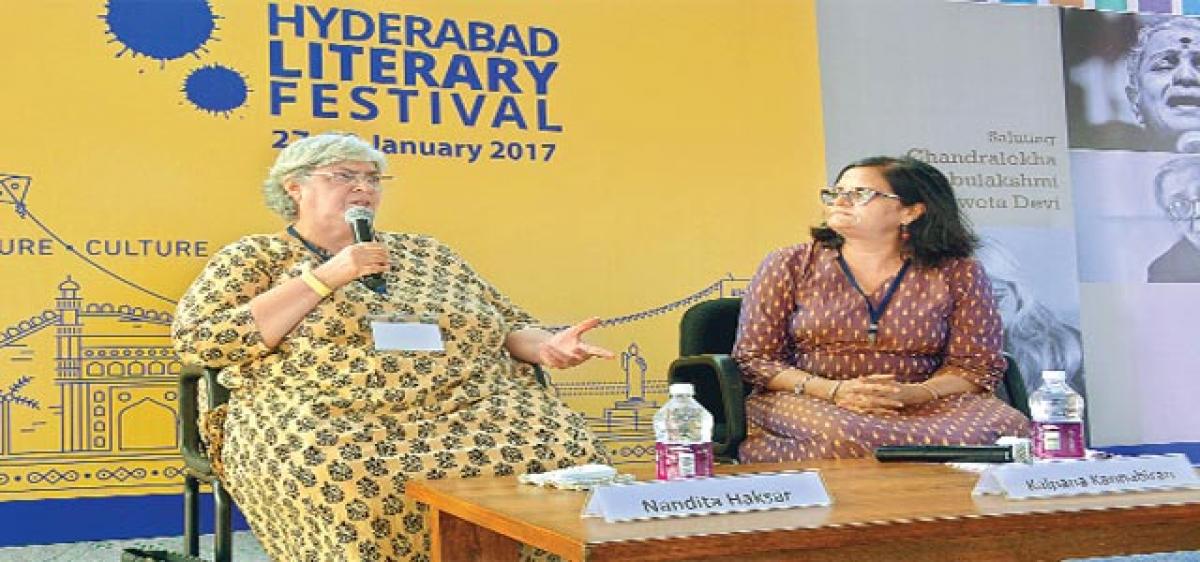Live
- Casual yet stylish office outfits for all-day comfort
- TTD to suspend all special darshans from January 10 to 19 amid Vaikuntha dwara darshans
- Naidu pats TDP leaders, cadres for enrolling 73L members
- Rupali Ganguly says for 20 years she never got an award
- Advanced anti-drone systems deployed for devotees’ safety at Mahakumbh
- Workshop on ‘Industry-Academia Practices in Civil Engineering’ concludes
- Revanth assures Kurma community of its due
- 204 cadets pass out of AFA
- Youngest chess king wins laurels for India
- FairPoint: Rahul’s rhetoric falls flat as PM Modi steals spotlight
Just In

The closing plenary on the first day of the Hyderabad Literary Festival was a conversation with Nandita Haksar hosted by Kalpana Kannabiran.
The closing plenary on the first day of the Hyderabad Literary Festival was a conversation with Nandita Haksar hosted by Kalpana Kannabiran.
With the Nandita’s history of human rights and feminist activism there was no shortage of complex, complicated and eminent topics.
As Kalpana Kannabiran transverses through the long career of Nandita, the topics moved from the post emergency Sikh massacre, to the Naga freedom movement, Kashmir nationalism and all other human rights violations that India was wrapped up in.
Nandita reaffirmed her beliefs about uniform civil code that she expressed in her books “Demystifying Law for Women”.
She considers her attacks on all religions equal just and correct. She has evolved on her views and realised that with respect to minority women or the northeastern Indian women they face a double disadvantage and discrimination.
Her only regret being that feminism had consumed the centre stage so much that the needs of the individual, Shah Bano Begum upon whose plight the movement was brought to the fore was victimised and her grievances were never properly resolved.
The demands on the whole were right but the means had taken up a cloud high view losing sight of the individual.
Next Kalpana wanted Nandita to share her experience and motivation for writing, “Three days in the life of the Nation”, a book in which Nandita documents the Delhi riots of 1984.
Nandita confessed to being a bad listener to the woes of the Sikh women because she couldn’t stand their pain and suffering. She had pre-existing prejudice and lacked exposure to Punjabi culture which may have limited her capability to empathise with what horrors the community may have endured.
She highlighted how cultural familiarity and association is crucial for a city or a community to come together and mobilise after a disaster or when a horror ravages civic life.
She recounts how she was confronted by the prejudice of the justice system when the judges mocked an affidavit by a Sikh woman about the rape of her daughter.
With respect to her association with the Naga freedom movement and the subsequent human rights violations by the Indian army she mused on her internal struggle as her values as a nationalist were at odds with her principles as a human rights activist.
She struggled against the same conflicting emotions with the Kashmiri nationalist movement. She still believes she is a nationalist and appeals to everyone to understand the complexity of the issues of nationalism and state or cultural freedom, as often times they are opposing views.
Though she has her issues with the constitution she is glad that a constitutional democracy exists in the nation which provides an avenue to confront injustice even if it is being perpetrated by the nation itself. - SA

© 2024 Hyderabad Media House Limited/The Hans India. All rights reserved. Powered by hocalwire.com







